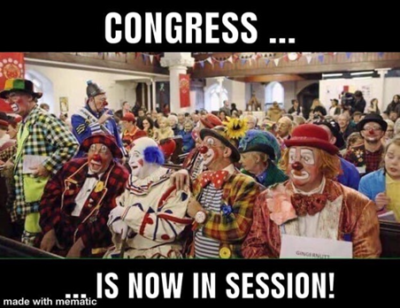This year is a sad milepost in the road to this nation’s financial Armageddon. Oct. 1 marks the 23rd straight year of beginning the federal fiscal year without a budget. Continuing resolutions are how the federal government does business.
We don’t do budgets…
This is the height of hubris. Our government is operating without balancing revenues and expenditures. We are headed for a fall. Authorizing spending is less than half of the job. Taxation, the accounting for revenues is part of the job of government. Budgeting is the process of prioritization of need. Then comes the spending authorization. The spending authorization cannot be allowed to exceed the current period revenue.
Missed deadlines and general dysfunction have become the norm. There is no federal budget and appropriations process. What is left is a sham. This is no longer a trend. AA trend implies a temporary nature. What we have are mounting budget deficits and unsustainable federal debt. And nobody seems to care.
Wait, Congress to the rescue
Dysfunction doesn’t have to be the norm. The people we elected to Congress have chosen to make it the norm. It is the choice today of the communist majority in Congress. Now there is a group of senators working to introduce the Government Shutdown Accountability Act.
The measure proposes automatic continuing resolutions. It would continue federal funding even if lawmakers are unable to agree on appropriations legislation. The act would also implement reforms compelling Congress to make the consideration of spending bills a priority.
Passing responsibility for budgeting to the federal bureaucracy
This is a horrible idea. It removes the last vestige of accountability in government. It effectively turns over responsibility for the federal budget to the fourth branch of government. The federal bureaucracy. It is important to remember that no legislative body can ever bind the next any action. This is simply a distraction. It is utterly irresponsible and as you might expect it has Maggie Hassan’s support.
Under current law, there are two potential results when Congress does not complete a budget by the end of the fiscal year. Congress usually can pass a continuing resolution. This delays funding decisions for several months. The other option is for Congress to do nothing. That requires the government to partially shut down until it can agree on spending bills.
A continuing resolution creates a new fiscal deadline. This is rather pointless when you are not honoring deadlines anyway. It also puts in place continued authority to spend. The measure simply sets up another reauthorization point. It kicks the can down the road.
Presto it’s automatic
Under the proposed automatic continuing resolution, government funding would revert to the status quo. Status quo spending is too high and out of control. It is an ignorant plan to allow indexed spending to accelerate further out of control without review.
Proponents argue the threat of a government shutdown compels lawmakers to make ill-informed decisions. It has been 23 years since they made a responsible decision. That’s a long time between good decisions. Building into the law an excuse to not have to deal with spending cuts and taxation is irresponsible.
Proponents argue it allows bad policy to sneak through during the 11th hour. They contend an automatic continuing resolution takes that threat off the table. Do you really believe that would mean more deliberate negotiations can proceed? They aren’t serious about budgeting now and would not be assuming passage.
Carrot dangling
Proponents dangle the carrot of this measure leading to better outcomes. They make the claim it would lead to lower spending. Those arguments are complete male bovine excrement. What we have is people who want to not deal with issues of taxation and spending control telling us that we will get better budget responsibility with an automated process. The proposal is so implausible as to be completely incredible.
There are other reforms proposed by the Government Shutdown Accountability Act. The bill uses a three-pronged approach to encourage lawmakers to engage in the appropriations process.
It’s one…
It incorporates the No Budget, No Pay Act. Lawmaker’s pay would be withheld if appropriations bills hadn’t been enacted on time. Pay would not resume until Congress passed all spending bills. Members would not receive any retroactive pay for the period of the lapse.
The idea is that missing a paycheck would compel Congress to get appropriations done on time. It’s a pipe dream. These people do not rely on their paychecks. Most are multi-millionaires. This is grandstanding. Pure and simple. It’s all hat and no cattle.
Two…
The act is prohibits Congress from recessing when it has failed to pass all appropriations bills on time. This is intended to prohibit the House and Senate from adjourning for more than eight hours if not all appropriations bills for the next fiscal year were passed by Aug. 1. This is more grandstanding. The bodies have procedural mechanisms that allow them to remain in session with very minimal attendance.
Three strikes you’re out…
If appropriations bills are not passed by August 1, the act would restrict lawmakers from traveling. This would ensure that members of Congress remain in Washington to finish the job. This is silly. These people are doing nothing good in Washington. If we want to help the nation we should dissolve Congress if they fail to pass a budget. Automatically cut federal spending by 10% across the board. Send Congress home for the balance of their term. Now that might motivate them.
Conclusion
These changes alone won’t fix unsustainable budgets. Maybe they encourage Congress to more actively engage in the appropriations process. It seems entirely doubtful. Some think this is a first step in prioritizing federal funding. Budget dysfunction doesn’t have to be the norm. Americans deserve and we have to demand better for more responsible action to take place. Government Shutdown Accountability Act; may it rest in peace.
